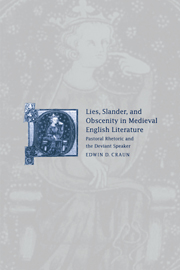 Lies, Slander and Obscenity in Medieval English Literature
Lies, Slander and Obscenity in Medieval English Literature Book contents
- Frontmatter
- Contents
- Acknowledgments
- Note on quotations and translations
- Standard abbreviations
- Introduction
- 1 The pastoral movement and deviant speech: major texts
- 2 The lies of the Fall, the tongues of Pentecost: typing and converting the deviant speaker
- 3 Exemplifying deviant speech: murmur in Patience
- 4 Confessing the deviant speaker: verbal deception in the Confessio Amantis
- 5 Reforming deviant social practices: turpiloquium/scurrilitas in the B Version of Piers Plowman
- 6 Restraining the deviant speaker: Chaucer's Manciple and Parson
- Bibliography
- Index
- CAMBRIDGE STUDIES IN MEDIEVAL LITERATURE
4 - Confessing the deviant speaker: verbal deception in the Confessio Amantis
Published online by Cambridge University Press: 31 October 2009
- Frontmatter
- Contents
- Acknowledgments
- Note on quotations and translations
- Standard abbreviations
- Introduction
- 1 The pastoral movement and deviant speech: major texts
- 2 The lies of the Fall, the tongues of Pentecost: typing and converting the deviant speaker
- 3 Exemplifying deviant speech: murmur in Patience
- 4 Confessing the deviant speaker: verbal deception in the Confessio Amantis
- 5 Reforming deviant social practices: turpiloquium/scurrilitas in the B Version of Piers Plowman
- 6 Restraining the deviant speaker: Chaucer's Manciple and Parson
- Bibliography
- Index
- CAMBRIDGE STUDIES IN MEDIEVAL LITERATURE
Summary
John Gower endows his pastoral voice with a name and a specific priestly task, if not a local habitation. Genius may come out of nowhere, like the speaker of Patience, but he has an identity. Gower makes a priest of Venus out of a figure created – and recreated variously – by classical and high medieval texts: a tutelary spirit incarnate in every human and a figure representing generation as the natural force of material existence (most notably in Alain de Lille's De planctu naturae and, focused more insistently on procreation, in Jean de Meun's part of the Roman de la rose). Summoned by Venus to conduct a confession, this Genius becomes even more complex when he announces that he not only will serve Venus by speaking of love but will also adhere to a priest's office by speaking of vice. Moreover, his discourse, not on a single sin but on all the Capital Seven and their offspring, is directed to a specific hearer: a lover who seeks release from lovesickness but who is commanded by Venus to tell first the full truth about his experience in love. The confessional dialogue gives this lover, as well as the controlling priest, a voice. The Confessio Amantis presents sequences (nearly forty) of interrelated acts of speech: the confessor's exposition of a type of sin, culminating in an invitation to confess it; the lover's confession; one or more tales directed by the confessor, as part of pastoral counsel, at what has been confessed. Within each, the lover counters his priest's discourse, accepting, adapting, modifying, subverting, contesting, ignoring.
- Type
- Chapter
- Information
- Lies, Slander and Obscenity in Medieval English LiteraturePastoral Rhetoric and the Deviant Speaker, pp. 113 - 156Publisher: Cambridge University PressPrint publication year: 1997


